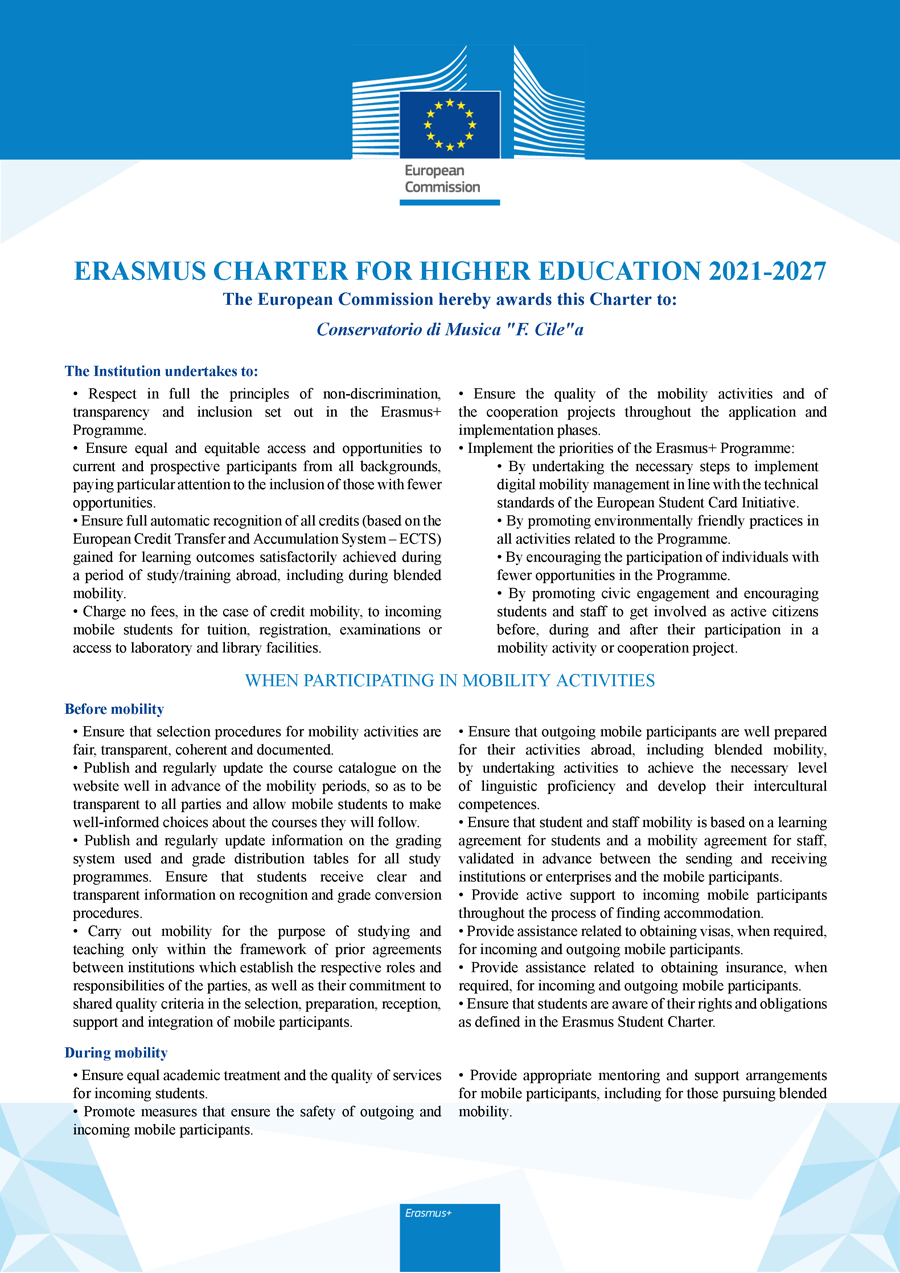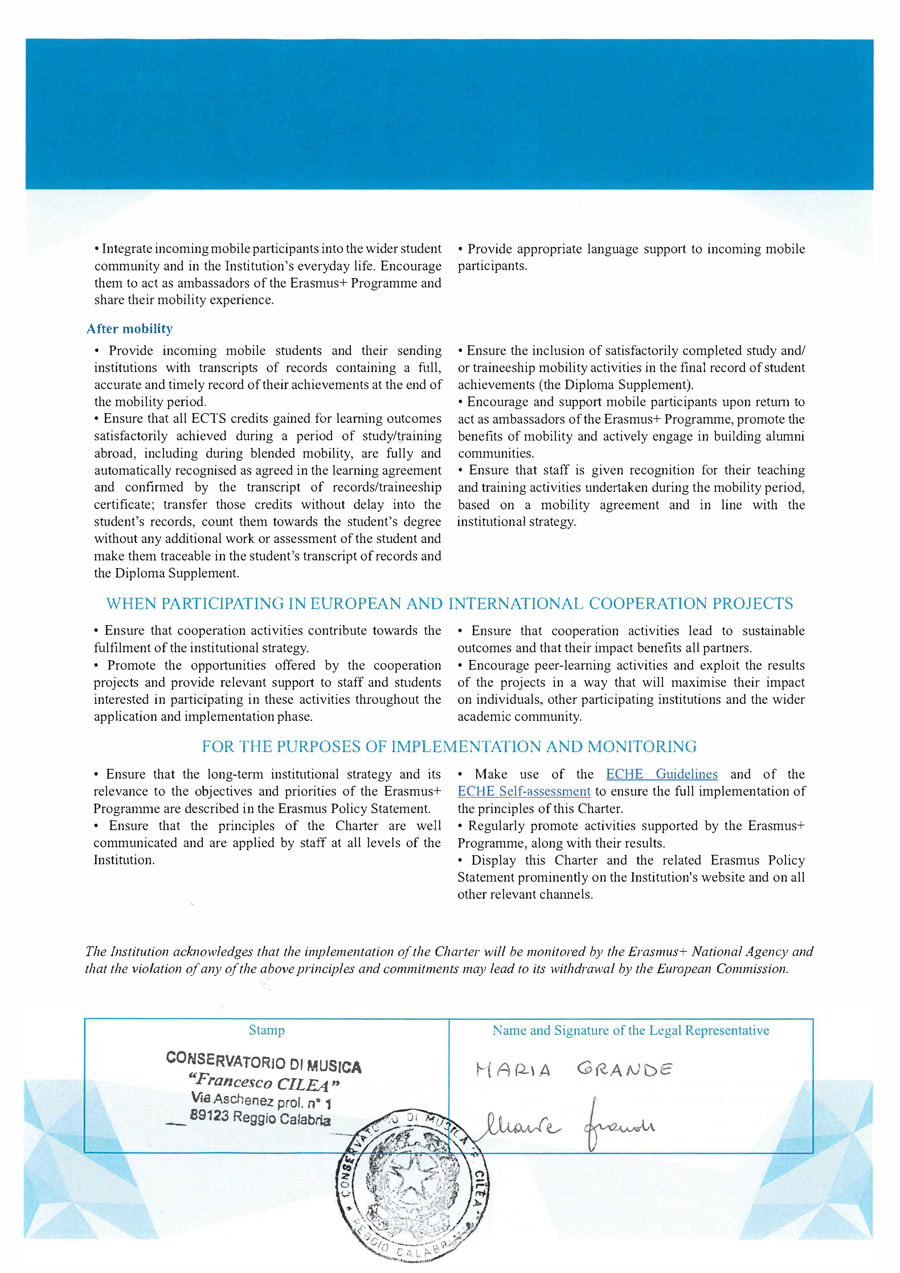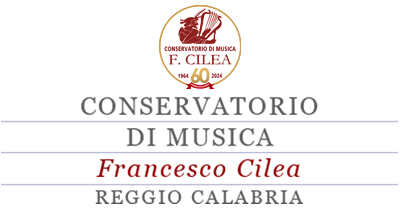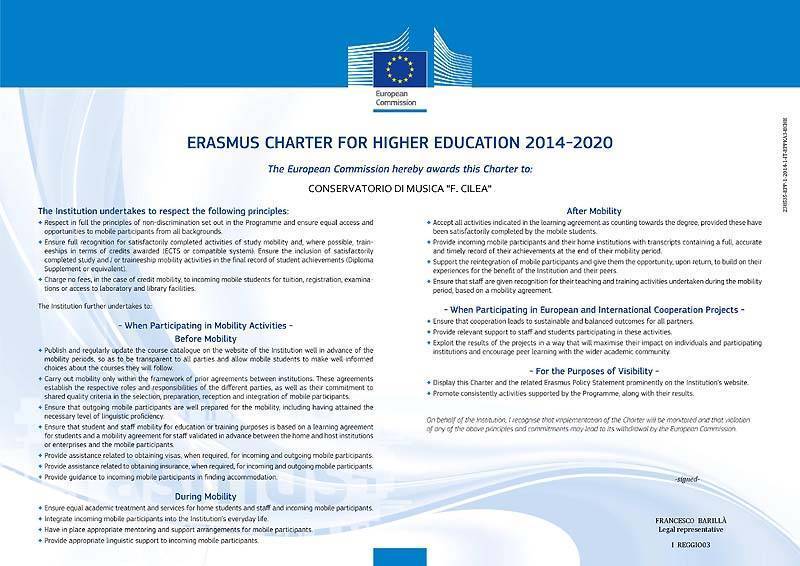Last update: January, 2023
↓ INCOMING STUDENTS ↓
Contact us:
Questo indirizzo email è protetto dagli spambots. È necessario abilitare JavaScript per vederlo.
|
PRACTICAL INFORMATIONS Deadline to apply (Erasmus students only): August 30th for whole Academic Year, autumn trimester (starting in November) or spring semester (starting in February) The Academic Year lasts from November 2nd to October 31th.
Please note that the applicants are not accepted automatically, we reserve the right to make a final choice of Erasmus students. Foreign non-Erasmus students should apply in compliance with the standard admission procedure.→ Grading system→ |
|
|
INCOMING STAFF Should you wish to propose teaching and/or training staff mobility, please contact us at Questo indirizzo email è protetto dagli spambots. È necessario abilitare JavaScript per vederlo. |
|
|
Erasmus+ Policy Statement 2021-2027 |
|
| Italian | English |
|
Il Conservatorio di Musica “F. Cilea" (ente italiano di diritto pubblico appartenente al sistema nazionale dell’Alta formazione artistica e musicale gestito dal Ministero dell'università e della ricerca scientifica, cod. ISCED 0215) ha una strategia di internazionalizzazione nello sviluppo della mobilità che segue le indicazioni delineate nella visione a lungo termine delI’Istituzione. |
The Conservatorio di Musica “F. Cilea” (an Italian public body belonging to the national higher education system in arts and music managed by the ministry of university and scientific research, ISCED code 0215) has an internationalization strategy in the development of mobility that follows the directions outlined in the long-term vision of the Institution. The strategy in this area particularly emphasizes the development and implementation of quality and internationally oriented education and the promotion of research and its international cooperation and involvement. The Institution aims to mantain and improve its international recognition as an academically quality and socially responsible HEI. Accordingly, the internationalization strategy of the Conservatorio di Musica “F. Cilea” focuses on: • involvement of foreign higher education teachers and students in the educational and research activities • enhancing interdisciplinarity in education • strengthen the international scope of the Institution • transfer of knowledge and experience of foreign experts • strengthening the scope of internationally based education and research. Following the previous participation in the Erasmus Programme since 2007, the Conservatorio di Musica “F. Cilea” has firmly believed that this program is essential for the modernization of the institution. Participation in Erasmus+ makes a significant contribution to the implementation of the strategic orientations of internationalization of the Institution, as well as to the achievement of 3 main priorities: • comparison and recognition of the level of knowledge and possible learning outcomes arising from the study programs and trainings at the Conservatorio di Musica “F. Cilea” with knowledge and learning outcomes abroad. This will be realized both through teacher mobility and the transfer of knowledge between foreign and home teachers as well as at the student level; • with the participation of foreign teachers, the Conservatorio di Musica “F. Cilea” will strengthen the quality of existing study programs and further intensify their international dimension, which is one of the important strategic directions of the Institution; • by participating in the Programme, the Conservatorio di Musica “F. Cilea” will be given the opportunity to contribute relevant new knowledge, quality education and training as well as opportunities for partnerships in the field of musicology research and music production. The specificity of the Institution is that it operates on a student-by-student basis and deals with each student almost individually, as common in the performing arts. Small groups (such as chamber ensembles) are an advantage of the Institution, as students are monitored from the beginning of their studies. The Conservatorio di Musica “F. Cilea” is committed to making the European Higher Education Area a reality. In 2007, it acquired the Erasmus University Charter, and in 2007/08 study and exchange of study mobility and mobility of staff was started. To this end, it has opened an international office, where a great emphasis is placed on promoting the mobility of students and staff. The Bologna process and the objectives of the Lisbon strategy are implemented at the Conservatorio di Musica “F. Cilea” to achieve excellence in teaching, research and policies, to ensure the international comparability of the programs, compared to ECTS, as well as scientific and professional titles. Internationalization is considered transversal to teaching, research and knowledge transfer and the Institution acts increasingly with an active attitude. Therefore, the establishment of all study programs is analyzed in an international perspective. The choice of partners by the Conservatorio di Musica “F. Cilea” is based on common objectives and competences, mainly in the music areas of competence of the Institutions. The Erasmus Programme encourages the Institution to move forward in the internationalization project and to constantly check the results in a transnational perspective thanks to its inspiration, its methods and its tools. It is a safe and tested track on which to follow the path of internationalization and modernization of the Institution. The adhesion to the Erasmus Programme is a source of pride and quality towards students, giving value to the educational offer and proposing safe growth opportunities. |


|
Erasmus+ Policy Statement 2014-2020 |
|
| Italian | English |
|
La necessità di confronto con gli altri paesi europei è prioritaria poiché favorisce innovazione, mobilità sociale e intellettuale, circolazione di saperi e competenze, aperture di prospettive di lavoro e di nuovo impiego. 1-Aumentare il livello di qualificazione per formare i diplomati e incoraggiare la sensibilizzazione dei discenti "non tradizionali", in particolare gli adulti; |
The necessity of comparing with other european countries is a priority because it promotes innovation, social and intellectual mobility, circulation of learning and skills, creation of working expectations and of first employment. 1-Increasing the level of qualification for the graduates and encourage awareness of 'non-traditional' learners, particularly adults; |
Il presente progetto è finanziato con il sostegno della Commissione europea. L'autore è il solo responsabile di questa pubblicazione (comunicazione) e la Commissione declina ogni responsabilità sull'uso che potrà essere fatto delle informazioni in essa contenute.
This project has been funded with support from the European Commission. The author is solely responsible for this publication (communication) and the Commission accepts no responsibility for any use that may be made of the information contained therein.
|
Conservatorio di Musica "F. Cilea"
|
|
|
Erasmus code:
|
I REGGIO03
|
| OID | E10106420 |
|
PIC
|
949637179
|
| ISCED 2013 code | 0215 |




